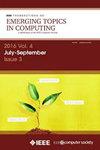Deep Learning Based Intelligent Tumor Analytics Framework for Quantitative Grading and Analyzing Cancer Metastasis: Case of Lymph Node Breast Cancer
IF 5.4
2区 计算机科学
Q1 COMPUTER SCIENCE, INFORMATION SYSTEMS
IEEE Transactions on Emerging Topics in Computing
Pub Date : 2024-11-12
DOI:10.1109/TETC.2024.3487258
引用次数: 0
Abstract
False-positive or false-negative detection, and the resulting inappropriate treatments in cancer metastasis cases, have led to numerous fatal instances due to human errors. Traditional cancer diagnoses are often subjectively interpreted through naked-eye observation, which can vary among different medical practitioners. In this research, we propose a novel deep learning-based framework called Intelligent Tumor Analytics (ITA). ITA facilitates on-the-fly assessment of Whole Slide Imaging (WSI) at the histopathological level, primarily utilizing cellular appearance, spatial arrangement, and the relative proximities of various cell types (e.g., tumor cells, immune cells, and other objects of interest) observed within scanned WSI images of tumors. By automatically quantifying relevant indicators and estimating their scores, ITA establishes a standardized evaluation that aligns with widely recognized international tumor grading standards, including the TNM and Nottingham Grading Standards. The objective measurements and assessments offered by ITA provide informative and unbiased insights to users (i.e., pathologists) involved in determining prognosis and treatment plans. The quantified information regarding tumor risk and potential for further metastasis possibilities serves as crucial early knowledge during cancer development.基于深度学习的智能肿瘤分析框架,用于定量分级和分析肿瘤转移:淋巴结性乳腺癌病例
假阳性或假阴性检测,以及由此导致的癌症转移病例的不适当治疗,由于人为错误导致了许多致命的病例。传统的癌症诊断通常是通过肉眼观察来主观解释的,这在不同的医生之间可能会有所不同。在这项研究中,我们提出了一种新的基于深度学习的框架,称为智能肿瘤分析(ITA)。ITA有助于在组织病理学水平上对全切片成像(WSI)进行实时评估,主要利用肿瘤扫描的WSI图像中观察到的细胞外观、空间排列和各种细胞类型(如肿瘤细胞、免疫细胞和其他感兴趣的物体)的相对接近度。通过自动量化相关指标并估计其分数,ITA建立了一个标准化的评估,与广泛认可的国际肿瘤分级标准,包括TNM和诺丁汉分级标准保持一致。ITA提供的客观测量和评估为参与确定预后和治疗计划的用户(即病理学家)提供了翔实和公正的见解。关于肿瘤风险和进一步转移可能性的量化信息是癌症发展过程中至关重要的早期知识。
本文章由计算机程序翻译,如有差异,请以英文原文为准。
求助全文
约1分钟内获得全文
求助全文
来源期刊

IEEE Transactions on Emerging Topics in Computing
Computer Science-Computer Science (miscellaneous)
CiteScore
12.10
自引率
5.10%
发文量
113
期刊介绍:
IEEE Transactions on Emerging Topics in Computing publishes papers on emerging aspects of computer science, computing technology, and computing applications not currently covered by other IEEE Computer Society Transactions. Some examples of emerging topics in computing include: IT for Green, Synthetic and organic computing structures and systems, Advanced analytics, Social/occupational computing, Location-based/client computer systems, Morphic computer design, Electronic game systems, & Health-care IT.
 求助内容:
求助内容: 应助结果提醒方式:
应助结果提醒方式:


